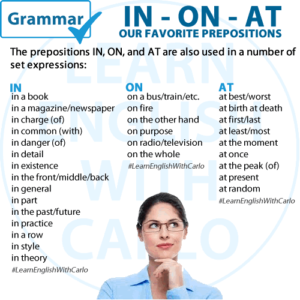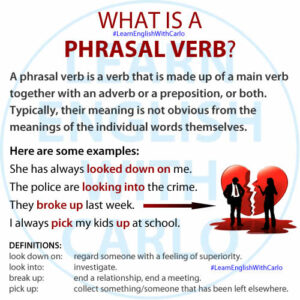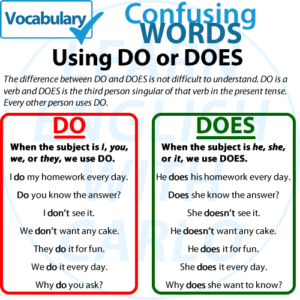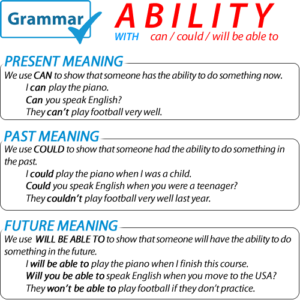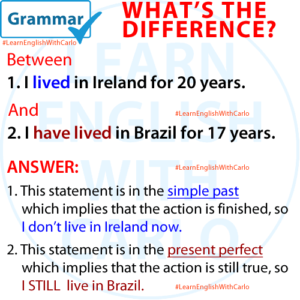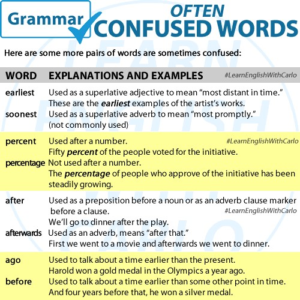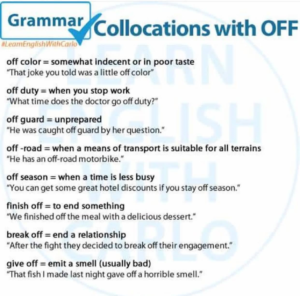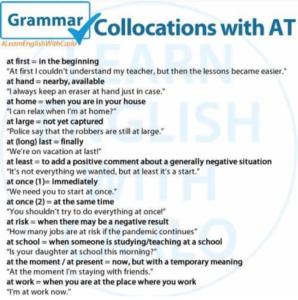The prepositions IN, ON, and AT are also used in a number of set expressions:in a book/magazine newspaperin charge (of)in common (with)in danger (of)in detailin existencein the front/middle/backin generalin partin the past/futurein practicein a rowin stylein theoryon a bus/train/etc.on fireon the other handon purposeon radio/televisionon the wholeat best/worstat birth at deathat first/lastat least/mostat the momentat …
Category: GRAMMAR
Permanent link to this article: https://englishyourway.com.br/grammar-in-on-at/
Nov 01
What is a Phrasal Verb?
A phrasal verb is a verb that is made up of a main verb together with an adverb or a preposition, or both. Typically, their meaning is not obvious from the meanings of the individual words themselves.There are many phrasal verbs in English. Here are some examples: She has always LOOKED DOWN ON me.(She thought …
Permanent link to this article: https://englishyourway.com.br/what-is-a-phrasal-verb/
Oct 31
CONFUSING WORDS – DO vs. DOES
The difference between DO and DOES is not difficult to understand.DO is a verb and DOES is the third person singular of that verb in the present tense. Every other person in the conjugation uses DO. When the subject is I, you, we, or they, we use DO. I do my homework every day.Do you …
Permanent link to this article: https://englishyourway.com.br/confusing-words-do-vs-does/
Oct 31
GRAMMAR – ABILITY using CAN, COULD, & WILL BE ABLE TO
We use CAN to show that someone has the ability to do something now.I can play the piano.Can you speak English?They can’t play football very well. We use COULD to show that someone had the ability to do something in the past.I could play the piano when I was a child.Could you speak English when …
Permanent link to this article: https://englishyourway.com.br/grammar-ability-using-can-could-will-be-able-to/
Oct 30
Simple Past and Present Perfect
What’s the difference between these two sentences:1. I lived in Ireland for 20 years.2. I have lived in Brazil for 17 years. ANSWER:1. This statement is in the simple past which implies that the action is finished,so…I don’t live in Ireland now. 2. This statement is in the present perfect which implies that the action …
Permanent link to this article: https://englishyourway.com.br/simple-past-and-present-perfect/
Oct 30
GRAMMAR – More Confusing Words
EARLIEST vs. SOONESTearliestUsed as a superlative adjective to mean “most distant in time.”These are the earliest examples of the artist’s works.soonestUsed as a superlative adverb to mean “most promptly.”(not commonly used) PERCENT vs. PERCENTAGEpercentUsed after a number.Fifty percent of the people voted for the initiative.percentageNot used after a number.The percentage of people who approve of …
Permanent link to this article: https://englishyourway.com.br/grammar-more-confusing-words/
Oct 27
GRAMMAR – Nouns & Prepositions
Some nouns are followed by specific prepositions. For example the noun relationship is always followed by with. A decrease in supply usually means an increase in price.Understanding the cause of a disease, makes it easier to find a cure for it.Pam noticed an improvement in the quality of her students’ work.Do sunspots have an influence …
Permanent link to this article: https://englishyourway.com.br/grammar-nouns-prepositions/
Oct 26
GRAMMAR – Collocations with off
off color = somewhat indecent or in poor taste“That joke you told was a little off color”off duty = when you stop work“What time does the doctor go off duty?”off guard = unprepared“He was caught off guard by her question.”off -road = when a means of transport is suitable for all terrains“He has an off-road …
Permanent link to this article: https://englishyourway.com.br/grammar-collocations-with-off/
Oct 26
GRAMMAR – Collocations with AT
at first = in the beginning“At first I couldn’t understand my teacher, but then the lessons became easier.”at hand = nearby, available“I always keep an eraser at hand just in case.”at home = when you are in your house“I can relax when I’m at home?”at large = not yet captured“Police say that the robbers are …
Permanent link to this article: https://englishyourway.com.br/grammar-collocations-with-at/
Oct 26
Good vs. Well
Permanent link to this article: https://englishyourway.com.br/good-vs-well/

